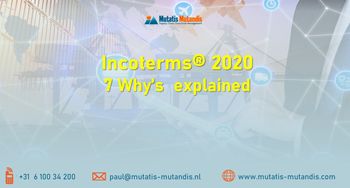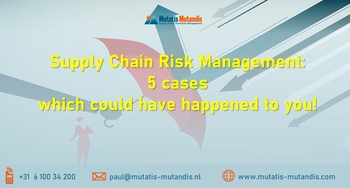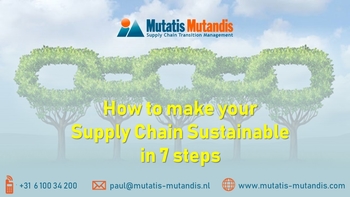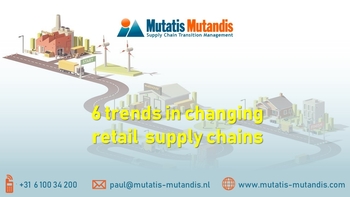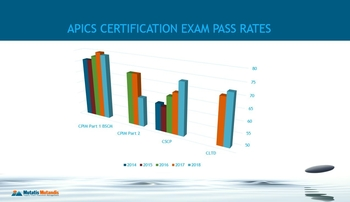Incoterms® 2020: 7 why’s explained
As per January 2020 a new set of Incoterms® will become active. This is a set of trade terms which describe:
Obligations: Who does what in f.e. organizing the carriage, insurance of goods, obtaining shipping documents, arranging for export or import licenses;
Risk: Where and when the seller delivers the goods, in other words where does the risk transfers;
Costs: Which party is responsible for which costs
Supply Chain Risk Management: 5 cases which could have happened to you!
Supply Chain Risks are usually seen as the (un)desired result of an event which could occur with a probability, have an impact and a degree of manageability in mitigation efforts.
Three elements which together will be expressed as the Risk Priority Number (RPN). The higher the RPN, the more important is the risk and the higher impact may be on profit, logistics and or reputation.
How to make your Supply Chain Sustainable: 7 steps
Sustainability, a lot of people regard it as an environmental issue, the climate change topic. Something that is far away from the day-to-day life. But it is more. It is a way of thinking in which we are striving to a balance in economic, social, environmental and ethical value. Sustainable supply chains are the result of processes that meets the needs of the present without compromising the ability of future generations to meet their own needs. It encompasses more than care for the environment.
How can we incorporate the sustainability approach into our Supply Chain? By taking the below 7 steps into account.
Changing Retail Supply Chains: 6 trends
The rise of eCommerce and fulfillment did change the retail landscape dramatically in the past decade.
Online was the trend and fulfillment centers dominating the world of distribution. Downside was that traditional retail relying on offline networks (physical stores) struggled and several went bankrupt.
Are the current eCommerce business models still valid?
6 trends which indicate that there are changes upcoming, which will redefine the current landscape and will have impact on current supply chains.
Are APICS certification exams to difficult?
APICS certification exams are an expert level certification exams which will unable to broaden your mind and helps you in securing high ranked job in a reputed organization. Passing these exams enables you to evaluate, learn, practice and prove new skills in unified conditions.APICS exams are regarded as the most famous and the most challenging supply chain certification exam.
APICS is using several methods to safeguard the level of the their exams, which are with great knowledge created by industry professionals and carefully monitored and assembled by PhD Psychometricians. As it is hardly impossble to pass the exams withouit having the needed knowledge, the APICS certification exams are regarded as the most valuable certification in supply chain. Nevertheless many students find it is a hard to pass APICS exams, and pass rates of in average 65% are scaring them off. Should it be?
NO, IT IS DOABLE!
Need more help to pass an APICS certication exam? First read the tips below. After done that feel free to contact me, so we can create a plan.
Supply Chain Sustainability: What is the color of your Supply Chain?
|
In this Expert View international master instructor en supply chain expert Paul Denneman in his presentation at the first International conference on Procurement and Supply Chian held in June in Kiev, Ukraine. Supply Chain Sustainability: What is the color of your Supply Chain? How green is your supply chain? How sustainable is your organization? Customers and investors become increasingly sensitive towards the ecological and ethical impact of supply chains in production, consumption, and transportation while still retaining a profit. Looking beyond the current take-make-waste extractive industrial model, a circular economy aims to redefine growth, focusing on positive society-wide benefits, like designing waste out of the system. Paul Denneman will take you on a journey which shows you the differences and similarities of traditional- and sustainable supply chain management. Questions after watching this video? Please do not hesitate to contact me. |
What is the Color of your Supply Chain?
|
In my opinion, supply chain sustainability - next to e-Commerce and Supply Chain Risk Management (SCRM) - will be one of the determing differentiators which will shape supply chains the coming years. Why? Just watch this video. Although most organizations are still in the phase of managing sustainability as a risk, we have to start managing it as a value during our journey to create a strategic advantage. Want to know how? Please contact me to explore our thoughts. |
Paul Denneman: First APICS Master Instructor CLTD world-wide
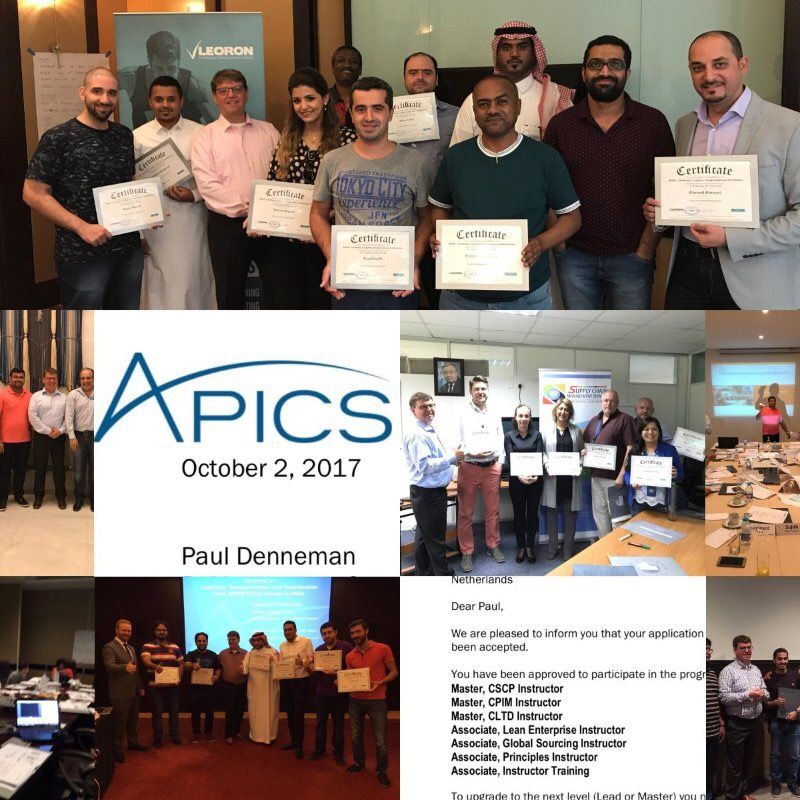 Within one year after APICS launched their new “Certified in Logistics, Transportation and Distribution” (CLTD) certification program, Paul Denneman has been recognized as the first APICS Master Instructor CLTD worldwide.Paul was already holding the APICS Master Instructor credentials for the programs Certified Supply Chain Proefessional (CSCP) and Certified in Inventory and production Management (CPIM).
Within one year after APICS launched their new “Certified in Logistics, Transportation and Distribution” (CLTD) certification program, Paul Denneman has been recognized as the first APICS Master Instructor CLTD worldwide.Paul was already holding the APICS Master Instructor credentials for the programs Certified Supply Chain Proefessional (CSCP) and Certified in Inventory and production Management (CPIM).
Logistics, transportation and distribution are rapidly changing industries and in need of standard benchmarks. The CLTD certification establishes industry wide best practices and gives recognition to those who are truly experts in the logistics, transportation and distribution.
